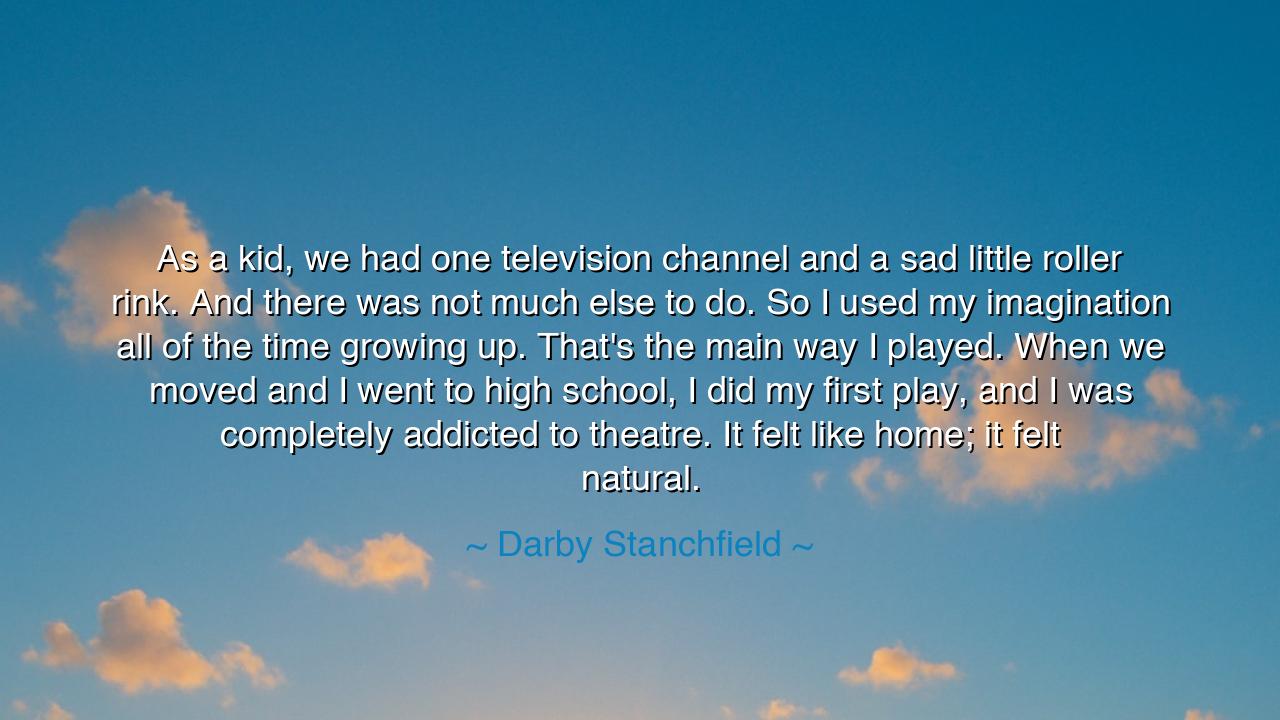
As a kid, we had one television channel and a sad little roller
As a kid, we had one television channel and a sad little roller rink. And there was not much else to do. So I used my imagination all of the time growing up. That's the main way I played. When we moved and I went to high school, I did my first play, and I was completely addicted to theatre. It felt like home; it felt natural.






Hear the heartfelt words of Darby Stanchfield, who speaks of her youth with candor and wisdom: “As a kid, we had one television channel and a sad little roller rink. And there was not much else to do. So I used my imagination all of the time growing up. That's the main way I played. When we moved and I went to high school, I did my first play, and I was completely addicted to theatre. It felt like home; it felt natural.” In this reflection, there is a truth that transcends her own story—the truth that deprivation often gives birth to creativity, and that where little is given from the outside, much may blossom from within.
Imagination is the fountain of the human spirit, the invisible realm where children build kingdoms and the weary find renewal. Stanchfield recalls a childhood where entertainment was scarce, yet instead of despair, she cultivated her inner world. With only one channel and a roller rink unworthy of delight, she turned to her own mind to create joy. Herein lies the first teaching: what the world withholds in abundance, the heart may supply in richness, if it dares to dream.
Her discovery of theatre was no accident, but the natural flowering of a seed long nurtured. For years, she had trained unknowingly, rehearsing in the quiet halls of her imagination. When at last she stepped upon the stage, it was as though she had returned to a long-forgotten home. What seemed sudden was, in truth, destiny prepared by countless hours of unseen play. Thus her addiction to theatre was not born of novelty, but of recognition—recognition of her truest self.
Consider the life of Leonardo da Vinci, who as a child in Vinci had no wealth, no great libraries, no treasure of knowledge. Yet he wandered the fields and streams, using his imagination to study birds, water, and machines. His curiosity, sharpened by simplicity, made him one of the greatest minds in history. Like Stanchfield, he found that where little is provided, the mind itself becomes a workshop of wonders. Limitation became the soil from which genius grew.
Her words also reveal the power of finding one’s place. Many wander without ever discovering where they feel truly natural, where their gifts and spirit align. For Stanchfield, it was the stage; for others, it may be the brush, the pen, the sword, or the plow. The heart knows when it has found its true dwelling, for it whispers, “This is home.” The task of life is to seek diligently until that place is found.
The lesson is clear: do not despise small beginnings or humble settings. Even in the absence of riches, distractions, or opportunities, the gift of imagination can prepare you for greatness. Use deprivation not as a chain but as a forge. And when at last the moment comes, when you step into the place that feels like home, embrace it wholly, for you will have found not only a passion but a calling.
Practical is this counsel: nurture your imagination daily, not only in youth but in every season of life. Limit the noise that drowns it, and give yourself time for silence and creation. Explore many paths until one feels truly natural, and then devote yourself to it with joy. For the home of the spirit is not always given freely—you must discover it, and when you do, you will know it as surely as Darby Stanchfield knew the stage was hers.
Thus her words shine as a beacon to all: “I was completely addicted to theatre. It felt like home; it felt natural.” This is the journey of the soul—to endure scarcity, to grow through imagination, and at last to arrive at the place of belonging. Let us learn from her example, that we may each find our own stage, our own home, and live not as wanderers, but as souls fulfilled.






AAdministratorAdministrator
Welcome, honored guests. Please leave a comment, we will respond soon